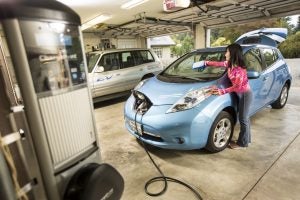 Americans are switching to cleaner cars and electricity. In addition to being smart purchases, these clean energy choices could be a political statement. Consumers are choosing to use their hard-earned dollars to show what they want: clean energy, a clean economy, and government policies that reflect their values.
Americans are switching to cleaner cars and electricity. In addition to being smart purchases, these clean energy choices could be a political statement. Consumers are choosing to use their hard-earned dollars to show what they want: clean energy, a clean economy, and government policies that reflect their values.
Last month, electric-car company Tesla was valued higher than General Motors, making it the most valuable U.S. carmaker based on market capitalization. Despite low gas prices, U.S. sales of plug-in electric vehicles increased by 70 percent in January from the same month in 2016. The Chevrolet Volt alone saw an 84 percent increase during the same time.
The increase in electric car sales isn’t surprising in light of The Consumer as Climate Activist, a scientific article published by researchers from Yale University, George Mason University, and the University of Texas. They found that Americans are more likely to engage in consumer activism than political activism to combat climate change. And consumer activism for clean energy is on the rise.
According to Dallas-based Clearview Energy, which provides customers with electricity generated by water, solar, wind, and geothermal power, their web sales have increased by 500 percent since the presidential election in November.
Purchasing power over politics: American consumers buy more clean energy and electric cars
Click To Tweet
Clearview CEO Frank McGovern says, “Every time Trump threatens to dismantle the EPA, our green energy plan sales skyrocket.”
These trends suggest that Americans could be fighting back with their purchasing power against the Trump administration’s assault on clean energy, which has been far-reaching since his inauguration in January:
- Newly-minted Secretary of Energy Rick Perry recently ordered the Energy Department to study whether requiring coal plants to reduce their pollution while incentivizing cleaner energy sources is responsible for coal’s irreversible decline. The results of a study based on this premise are primed for use as propaganda to prop up the uneconomic coal industry, because government data clearly shows low natural gas prices, declining electricity demand, and plummeting costs for renewables are the reasons for coal’s demise.
- Trump’s 2018 budget proposal, released in March, aimed to significantly defund a number of federal clean energy programs and energy efficiency efforts (including the broadly-supported Energy Star program). While Congress recently reached a budget deal to fund these critical programs through fiscal year 2017, September (when the 2018 budget must be voted on) is now the new showdown date for the future of federally-funded clean energy programs.
- Trump said he would review car fuel-efficiency protections that require the industry to deliver a fleet average of at least 54.5 mpg by 2025. California Gov. Jerry Brown called the President’s move toward potentially axing clean cars an “unconscionable gift for polluters.” California and New York plan to challenge the action with a lawsuit against the EPA.
- EPA Administrator Scott Pruitt has publicly questioned whether carbon dioxide is a primary contributor to climate change.
As consumers, we can use our purchases to change the way power is made and change the powers that be. So let’s be smart, let’s be strategic, and let’s fight the good fight. You have choices as a consumer – whether you’re buying your next car, choosing your electricity provider, installing solar on your home roof, or replacing a home appliance. Make a statement and choose to buy clean.
By Jim Marston
Photo credit: John Rae
Enviroshop is maintained by dedicated NetSys Interactive Inc. owners & employees who generously contribute their time to maintenance & editing, web design, custom programming, & website hosting for Enviroshop.
